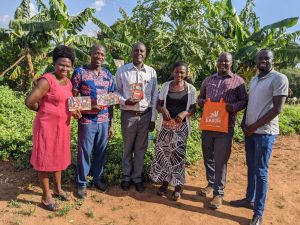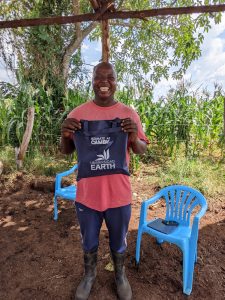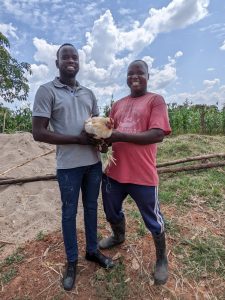An ally for social change in Africa
On one of Julius Mbuga’s (’05, Uganda) visits promoting EARTH University to secondary schools in East Africa, a man listened attentively to what Julius was saying. The man imagined a large, green, open space with students of different nationalities living among nature. Teachers worked the land together with young people who dreamed big and were not afraid to get their hands dirty to learn.
The vision seemed idyllic, especially when Julius mentioned that students could apply for a partial or full scholarship and that the application was free and personalized. He said any young person could apply and travel from Africa to Costa Rica to study at EARTH, regardless of their context or social status.
That man, who could not believe what he was hearing, is David Alirekie. His disbelief has its own story. David lost his father when he was eight and had to face a myriad of challenges to gain access to education. When he finished high school, he wanted to apply for a scholarship to a university in Egypt, but it wasn’t easy to do so from his village in a remote and rural part of Uganda. After great effort, he managed to get to the interview site, but the admission process had finished. David concluded that opportunities came quickly to others – those in a higher social class, sons and daughters of politicians or high-ranking officials. He was none of that. Therefore, he decided to create his own opportunities if they were not immediately available for young people like him, and without anyone’s help, he graduated and became an educator.
When David heard Julius speak, he was working as a teacher at the Cornerstone Leadership Academy in Rwanda, which facilitates education for at-risk children and young people.
Although David could hardly believe that a place like EARTH existed on the other side of the world, a few months later, one of his students, Annet Mukamurenzi (’16, Rwanda), was admitted. She traveled to Costa Rica and confirmed that what Julius said was true. Anette had a full scholarship, lived in a green and open space with young people from many countries, and learned while getting her hands dirty.
“That opened my mind. I couldn’t believe that this universe existed hundreds of miles away from here and that it allowed us to send an unknown student from Rwanda to Costa Rica, where she felt welcome and, beyond education, given a home,” says David.
That was the push David needed to become our ally and assist hundreds of young Africans through their admission process to EARTH. He does everything he can to help, like lending his personal computer or electronic device to students who do not have internet so they can fill out the admissions forms. He even found solutions amid the COVID-19 pandemic in 2020 for young people who lived in a refugee camp to leave and live in a place with the facilities that allowed them to participate in EARTH’s distance-learning Spanish Program.
“I have seen Earth’s commitment to the admission process. If they have difficulty contacting a student in a distant village, officials call other people to ask for help until they find the person. EARTH gives everyone a chance, and that motivates me to work and help with the process,” explains David.
David does all this voluntarily while seeing himself reflected in the face of every young person who, like himself, a few back, hopes to access quality education to transform their lives and their community. He wants all young people full of potential to not miss any opportunity because of their context, family situation, or social class. David’s commitment to youth is so outstanding that he co-founded Acts4Rwanda, an organization that seeks to break the cycle of poverty through educational opportunities.
David, his wife, Susan, and their seven children (three of them adopted), also have a farm where they teach small farmers good agricultural practices to plant in limited spaces. Some of the EARTH graduates, whom David has supported since the beginning, have joined this project.
In 2017, David traveled to Costa Rica as a guest at the graduation of Gerard Ndayishimiye (’17, Rwanda), a Cornerstone student with whom he had a strong bond.
“I was impressed by the natural wealth, vegetation, trees, fruits, and how people protect natural resources. I was also impressed to go to the cafeteria and see teachers sitting at the same table with students. There is an abysmal difference in Africa – teachers are above the students there, and these more human exchanges are rare. Closeness prepares better professionals – people who do not see or live by cliques or social classes, but through empathy, thus generating horizontal relationships,” David says.
Thanks to the help of people like David, EARTH has the possibility of finding future leaders on the African continent, people with a powerful social commitment ready to change the world.








